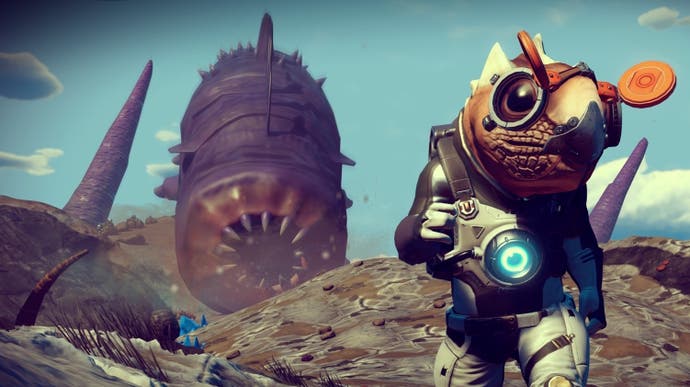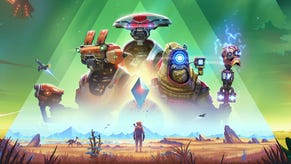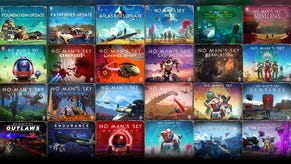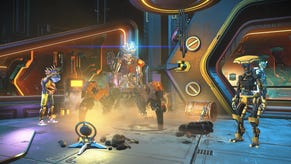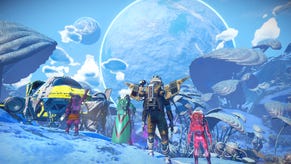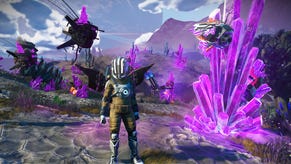Six years later, No Man's Sky finally gets its sandworm
Sean Murray chats about today's massive Origins update.
It's perhaps the last remaining hangover from No Man's Sky's rocky launch; the poster child for what many saw to be promises unfulfilled and the one major pre-release tease that's continued to remain elusive, despite four years of tireless post-launch support. But now, six years after its initial 2014 unveiling, Hello Games' exploratory space sim finally has its sandworm.
Sandworms are just one of the many, many new additions in No Man's Sky's latest update, one the developer is calling Origins for reasons that will become clear; despite 2020 having been an unusually busy year for No Man's Sky in terms of release frequency, Origins, which launches today on Xbox One, PS4, and PC, is another mammoth undertaking, rivalling the size and scope of No Man's Sky's previous Next and Beyond updates.
Yet while both of those took a rather scattershot approach to expansion - delivering everything from multiplayer to VR support between them - Origins is unusually laser-focussed in its inception; it's also arguably the update that fans of No Man's Sky's early exploratory promise have waited for the longest, finally giving the four-year-old game a massive injection of variety.
As Hello Games' Sean Murray explains it, "We've changed the game a lot since launch, but that fundamental universe is sort of the same shape and size as it always was. And the goal [with Origins] is to change that; it's hung over me for a long time that it's fundamentally the same [universe] that was our best first step. But we haven't revisited that. And that's kind of why we call this Origins really, to get across that it's also a bit of a fresh start for us, and gives us a bunch of powers and abilities as developers that we didn't have before."
Murray says the studio has been laying down the technical groundwork for Origins for nearly 18 months now, and the end result is "mathematically" double the variety and diversity of No Man's Sky original universe. There's new fauna with expanded behavioural patterns, new flora, a broader colour palette, new mega-structures, improved clouds, new planetary types and terrain generation - introducing "multiple-kilometre tall mountains, craters, chasms, and rivers that just weren't possible before", even volcanoes - and it's all topped off with a new localised weather system capable of delivering the likes of firestorms, tornadoes, blizzards, lightning storms, even the odd meteor shower.
It's a massive update following other massive updates, many of which have, as No Man's Sky's community has grown and Hello Games has moved to satisfy some incredibly diverse demands, somewhat shifted No Man's Sky away from its 'lonely wanderer' roots. "You know, it's really interesting to work on a game where people play it so, so differently to each other," says Murray, "When I was working on Burnout, Burnout is one thing, and everyone played it the same way, and bought it for the same reason, but No Man's Sky is so many different things to people; some are just building their base and building up a little community, and it's more about the kind of social aspect, and some people are the absolute opposite of that, and they never want to see anyone and they play completely on their own, they just want to explore."
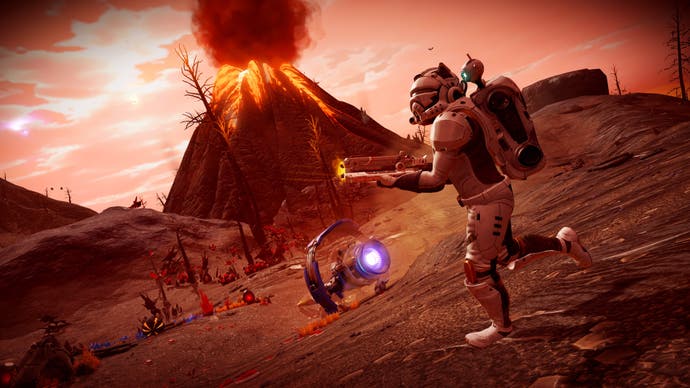
Origins, then, seems almost tailor-made for that second group, one that's been somewhat underserved over the last four years of relentless expansion. Yet despite it arguably offering the biggest shakeup of No Man's Sky's universe yet, Hello Games has worked hard to minimise disruption. As Murray points out, No Man's Sky's player base is bigger than ever in 2020 thanks to its continued expansion and the likes of cross-play and Game Pass, and many in its incredibly dedicated community have invested hundreds of hours in the game. "They build little communities, farms, monuments, they name discoveries after their kids", explains Murray, "[so] we've tried to avoid anyone losing progress, losing the things that they've worked so hard for and the things that are important to them [but] we've tried to balance that with the fact those who play for the longest time are the ones who are most excited about newness."
And so the solution: "Instead of destroying those existing planets," says Murray, referencing No Man's Sky's earlier, apocalyptic universe resets, "we've kind of birthed billions of new ones". Familiar solar systems now bustle with new additions while older planets remain largely untouched, so that bases and other remnants of previous toils can live on, even if No Man's Sky's myriad new systems mean even older planets now bring their share of surprises.
And then, of course, that sandworm; I ask Murray if finally having the creature - one of No Man's Sky's most notable continued omissions from the early days of pre-launch publicity - in-game feels like a kind of closure for the team.
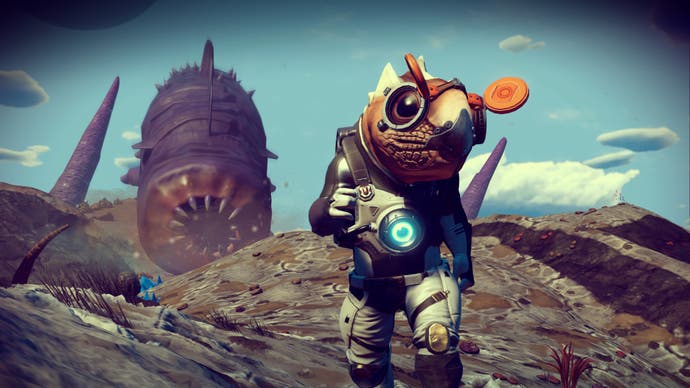
"It's funny," he says, "we showed it in a trailer before release, and, you know, we were very naive at the time, because we would just work on stuff, and then record a video of what we had working, and then show that off to everyone and not really think like, is this going to ship? Because we're developers, and we just assumed everyone knows how development works."
"The sad truth is," continues Murray, "[the sandworm] wasn't very fun during development. You got a little taste of how the people must have felt hunting for Spice in Dune, you know, just suddenly getting killed by these things, with no explanation... And then ever since then, about every six months, somebody on the team will be like, 'Come over, have a look', and they've put the sandworms back in. We've had multiple stabs at it, and this time it just clicked."
"There are things, and it is a joy to work on them, where we know the community is gonna love this... and sandworms are one of those; these poor sandworms have been put on a pedestal over the last few years, but it's really fun and it kind of makes you excited about the work because you're doing something that you know people are gonna love."
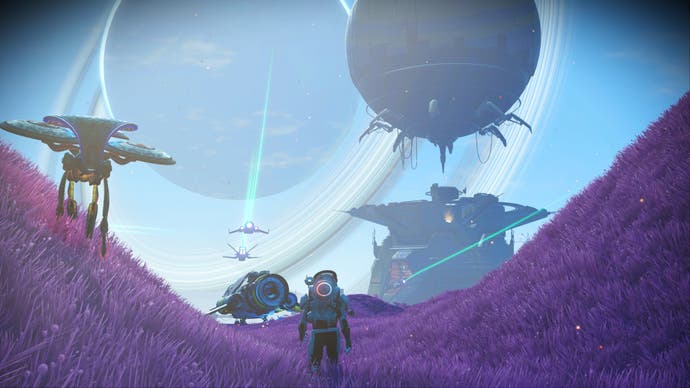
"You know," Murray continues, "we got review-bombed right at the start on Steam, and we were Overwhelmingly Negative or something like that, we had like 10 times the number of reviews you would normally have for a game. And we have over the last four years, just every month, just come up in terms of reviews. And we always joke about this: when we reach Mostly Positive, then the chapter is closed, or when the sandworm goes in, then we close the book, but I don't think that book will ever be closed... there will always be more work to be done."
Indeed, not only has 2020 seen No Man's Sky adopt it's most frequent update schedule yet, it's felt like one of Hello Games' most creatively adventurous periods - introducing the likes of living ships, huge stompy mechs, abandoned space station missions with a heavy horror focus, even dashboard bobbleheads - despite now being well into its fourth year of post-launch support.
And what of the future? Murray has already confirmed the studio is working on its next game, although he's reluctant to share more at present ("We... we talked about a game a little bit too early once," he laughs) and, of course, the new console generation looms on the horizon too.
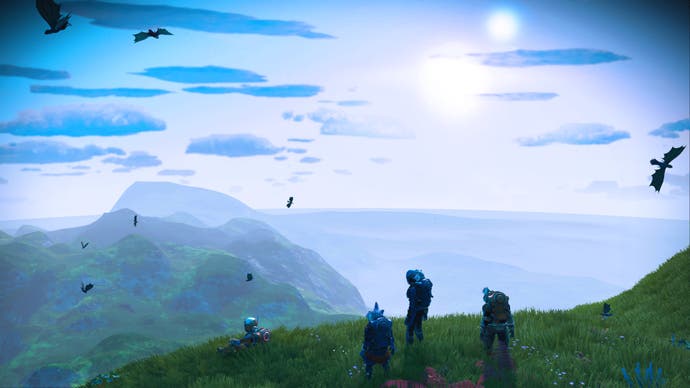
While Hello Games isn't quite ready to share any plans it may have regarding Xbox Series X and PS5, Murray admits to being excited by their potential. "It's super interesting for us, as developers," he explains, "particularly with this kind of interest in procedural-generation...I think next-gen is more exciting than people might realise. I think we're at the limit of what people can make, what humans can make in terms of something like, I don't know, Assassin's Creed. We're pretty much hitting the upper limit of what a few thousand people can make on a game, and when it gets really exciting is when we start looking at using the power of those devices to do more than just render what people have already made."
For now though, No Man's Sky continues its breathless march forward. "You know," says Murray, "the moment we stop having ideas that we are excited about, or the moment that we're not excited about what we're doing, we will stop, [but] hopefully it comes across that we're still excited about it and enjoy it, and we've still got ideas and cool things that we want to do and as long as that keeps going, then we'll keep working on it."
